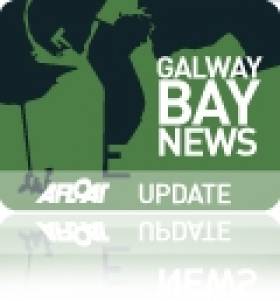Displaying items by tag: No Salmon Farms At Sea
Groups To Protest Marine Minister's Office Over Galway Bay Salmon Farm
#FishFarm - A group opposed to the Galway Bay deep-sea salmon farm proposals has announced it will protest the constituency office of Marine Minister Simon Coveney this Saturday 15 December.
In a statement to the media, No Salmon Farms At Sea (NSFAS) said that it will join likeminded groups Save Bantry Bay, Save Galway Bay, FISSTA and Friends of the Irish Environment, along with other local and national organisations, in a protest march through Carrigaline, Co Cork to Minister Coveney's office in the town, where invited speakers will address the crowd to express their opposition to the fish farm.
As previously reported on Afloat.ie, the 15,000-tonne deep-sea organic salmon farm would be located on a 500-hectare site in Galway Bay off Inis Oirr in the Aran Islands, and would be one of the largest projects of its kind in Europe, projected to be worth more than €100 million annually for the economy, according to Bord Iascaigh Mhara (BIM).
But the proposals have raised the ire of local anglers and conservationists who fear the development could have a negative impact on wild salmon numbers in the area.
"Minister Coveney has been a strong supporter of the aquaculture industry and we intend to let him know that his support is misguided and will result in catastrophe not only for our stocks of wild atlantic salmon and sea trout, but also for the communities and local businesses that depend on their very existence," said NSFAS.
The statement also cited the recent international study involving experts from Inland Fisheries Ireland which concluded that 39% of all young salmon mortalities are directly attributable to sea lice in areas where salmon farming takes place.
It added: "The highly inflated number of jobs, which BIM claim will be created, will be far outweighed by the number of jobs lost in areas where no other industry exists apart from that in tourism...
We have a world class sport fishery here in Ireland and our outwardly projected clean environment is one of our greatest assets. However it is fragile and will be destroyed if the salmon farming industry is developed further.
"Anglers and conservationists will do everything in their power to prevent any further destruction to our environment and already declining wild salmon and sea trout stocks."
Meanwhile, in today's Irish Times, angling correspondent Derek Evans writes that "anglers, stakeholders, hoteliers, restaurateurs, islanders and west coast citizens are 'up in arms' and rallying in large numbers in opposition" to what he describes as "this outrageous proposal".
He also backtracked on his previous claim about the location of the deep-sea farm as "a step in the right direction", explaining that he was contacted by a man living on Inis Oirr who said the location for the new fish farm is just "one land mile" opposite the beach, posing a threat to its tourism assets.
The Irish Times has much more on the story HERE.
























































